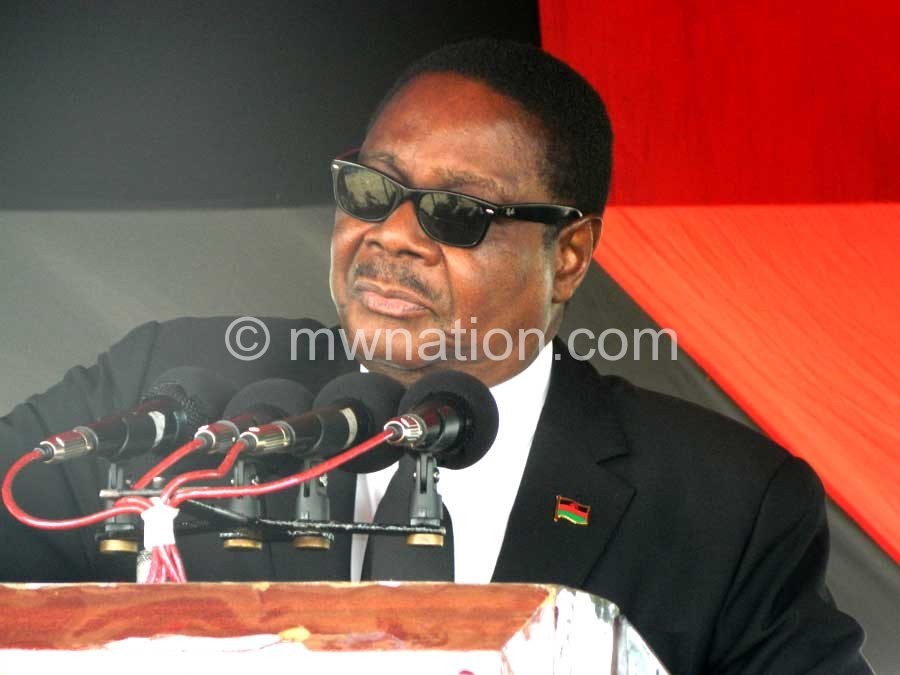APM suspends MSB sale
President Peter Mutharika has suspended the proposed sale of wholly State-owned Malawi Savings Bank (MSB) and instead invited all stakeholders to debate and review the future of the bank.

The President, who had been faulted by civil society organisations (CSOs) and opposition members of Parliament (MPs) over his silence, announced his stand through a six-paged statement read on his behalf by presidential press secretary Gerald Viola at Kamuzu Palace in Lilongwe.
Declared Mutharika: “Having listened to both sides of the debate, government has decided that the [sale] transaction be suspended. During this period, government intends to review the process that was undertaken.
“The review will cover all the aspects of the transaction. I am, therefore, inviting all those who have spoken on this matter, including members of Parliament, civil society organisations and the [financial and business] experts to come up with reasonable proposals covering all the aspects of the transaction, so that we can map the way forward.”
He said government proceeded with the MSB disposal on strong technical recommendations from key experts, including the Institute of Chartered Accountants in Malawi (Icam), the private sector, the donor community, the International Monetary Fund (IMF) and the regulator of financial services—the Reserve Bank of Malawi (RBM).
The President observed that despite pleas and explanations by Minister of Finance, Economic Planning and Development Goodall Gondwe, critics of the sale did so on political and sentimental grounds, including the advancing of the issue of toxic loans.
He explained that the issue of toxic loans between the bank and its debtors is in court and that government has set up a “Special Purpose Vehicle” to ensure that every tambala owed to MSB is fully recovered.
Mutharika advised Malawians to learn from a similar case of divided opinions that delayed the sale of Air Malawi despite expert advice to the contrary.
He said: “We argued, quarrelled and rumbled about it. By the time we concluded the transaction, Air Malawi was a mere shell and government ended up with huge debts to settle.”
Last week, The Nation reported that delays in privatising MSB were eroding confidence in the bank among customers with some, including public institutions, withdrawing their deposits to other institutions.
The development attracted warnings from a market analyst and the Economics Association of Malawi (Ecama), who said the uncertainty surrounding the bank’s sale could attract a run on the institution.
Earlier last month, the Ministry of Finance, Economic Planning and Development, in a statement titled Recapitalisation of Malawi Savings Bank, bemoaned that negative publicity surrounding the transaction grossly weakened the bank’s ability to trade, prompting customers to withdraw deposits exceeding K11 billion (US$24.4 million) between February and April this year without replacement.
In the statement, government admitted creating the situation that has put MSB in its current predicament, acknowledging that it used the bank to offer loans and make payments that ended up compromising the professionalism of the bank’s management.
Ecama president Henry Kachaje, in a written response to The Nation questionnaire, said there was a high possibility that should the engagement of a strategic partner take much longer, Malawians might end up losing the very investment some are claiming to protect.
He said: “We need to draw lessons from history. The case of Air Malawi was similar to the MSB case. A strategic partner was identified, but the fights and delays that followed made the strategic partner shy away and in the end, the whole company collapsed. Let us not do the same with MSB.”
Earlier this year, government, through the Public Private Partnership Commission (PPPC) invited bids from strategic investors to buy its stakes in MSB and Indebank Limited, in which Capital Hill has majority stake.
Through the transactions, government wanted to, among other things, ensure that MSB and Indebank met new Basel II regulatory requirements in terms of capitalisation.
National Bank of Malawi (NBM) has since been named the preferred bidder for Indebank while FDH Financial Holdings Limited—owners of FDH Bank—was the sole bidder for MSB.
Two weeks ago, CSOs petitioned Parliament to stop the sale of MSB and the groups later asked President Peter Mutharika to intervene.
MSB has the widest footprint with 74 points of representation nationwide and a workforce of about 600.





